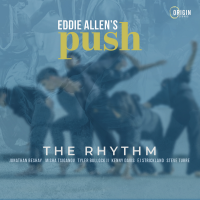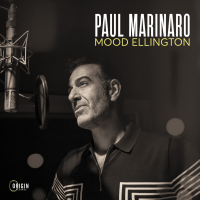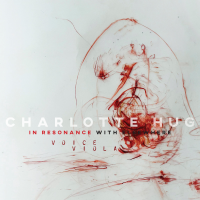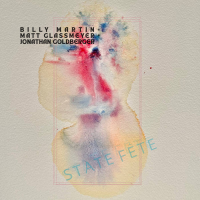Home » Jazz Articles » Album Review » Eda And: Live in Hamburg
Eda And: Live in Hamburg
Covid's travel restrictions had made And more reminiscent about her Turkish roots while sequestered in her second home in Hamburg. Emotions of longing that surged under lockdown were distilled and channeled into recreations of Turkish pop and folk songs with jazz-influenced arrangements, under her hands which had been trained classically since childhood.
And's father had played contrabass in the Izmir State Symphony Orchestra for over 20 years, moonlighted with jazz standards in nightclubs, and created an "ear archive" for his daughter by rehearsing that broad variety at home. Read our coverage. Advanced studies in both classical and jazz composition took her to Germany. But her Turkish origins tugged at her, and this release revisits her homeland.
Two songs are by Sezen Aksu, the vocalist queen of Turkish pop. One, "Istanbul Istanbul Olali / Istanbul Must Be Istanbul," is rendered as an instrumental. It begins slowly, and then becomes more expressive. Its vocal lyrics, as performed by Aksu and others, mourn lost love as a characteristic of Istanbul. And omitted the lyrics to reach western and eastern ears on the melody alone, as on other numbers, informed by jazz harmonies and improvisation points.
Another Aksu composition, "Kalbim Ege'de Kaldi / My Heart Remains in the Aegean," a strong ballad when rendered vocally, is recast by And to be quiet and meditative. The song was originally written for the lute, in 10/8 time. And reharmonized the piece for piano and created a groove from increments of the time signature. For And, the song contrasts the north German, almost Scandinavian, culture of Hamburg, with the turquoise waters, olive trees, and warmth of the Turkish coast. An original composition by And, "Istanbulisation," sees the city as a site for personal formation, delivered in English in a vocal style reminiscent of Laura Nyro and the nostalgic pianism of Hiromi Uehara's Place to Be (Telarc Jazz, 2009).
Sezen Aksu has sold forty million albums in Turkey and the Middle East, but is otherwise little known beyond those regions except to Turkish migrants. Turkish music has not gained traction in the West, although its variable rhythms have been sampled for rock, reggae, hip-hop and jazz. The verbal language is decidedly "foreign:" it is neither built upon nor phonetically similar to the Latin-based Romance languages, and is peppered with the hard sounds of consonants. And says that Western audiences are missing out on the fun they could have with Turkish dance grooves, the passion of melodies constructed from makam modes, and the variety of microtonalities in Turkish instruments.
Live in Hamburg experiments freely with music which, despite the title, is not at all German. "Uzun İnce Bire Yoldayum / I'm on a Long Thin Road" was originally a folk song by Asik Veysel, a now-deceased blind Anatolian folk troubadour, a kind of Turkish Pete Seeger, from the Alevi sect, an indigenous, humanistic, and sometimes-suppressed unorthodox branch of Islam. Created by Veysel on the lute—like bağlama or saz, And transposed the music for piano into a series of related movements suggesting a series of continuing patterns within the flow of life.
Victor Jara was a Chilean poet and songwriter, another folk philosopher, killed as a communist activist in the Pinochet overthrow of the Allende government there in 1973. And begins an homage to his instrumental song "La Partida" on charango, a smaller ten-string Latin American antecedent of the guitar, and then shifts the melody to piano. The flow of that music, she says, reminds her of Jara's commitment to freedom.
She borrows from an old anonymous Turkish song "Yüksek Yüksek Tepelere / To the High High Peaks." It is lightly spirited, with some of the repeated motifs similar to the continuous steps in hiking or a long walk. The 9/8 time signature is the same as used in "Blue Rondo a la Turk" by Dave Brubeck on his 1959 Columbia album Time Out. It derives from aksak, a rhythmic system in which pieces or sequences, executed in a fast tempo, alternate in groups of 2 and 3. Western ethnomusicologists have viewed the patterns as being irregular.
Here, And groups them as 2+2+2+3, and the rhythm gives her a feeling of jumping and dancing. The song is a traditional number at Turkish weddings, in which the marriage is celebrated but also mourned as the bride leaves her home village and moves to the groom's home far away, perhaps in distant mountains. And sought to create a positive perspective on the sad story: she begins slowly, but then shifts into a classical Rondo form with jazz elements for a fresh and hopeful sound.
"Ben Seni Sevduğumi / I Love You" is from yet another folk song, also in modal melodic construction and 10/8 signature. Its words, omitted from And's instrumental treatment, address lost love: "I let everybody know that I love you. I spread out the carpet in front of your house. Spring came, summer came, green leaves opened. It's been a long time since I saw my love last time. I am still hungry for her presence. But apparently it is black earth's turn now." And re-interprets the song lightly, to remember what good times there were, with gratitude for those past times together.
The Turkish word for thanks is "teşekkürler," with that characteristic abundance of consonants and lingering Turkish warmth. In drawing upon her source material, it's a word that Eda And distributed generously in the credits to this solo album. The order of songs traces a path to resolution from the alienation of "Istanbul Olali," through Jara's doomed quest for freedom, to the warmth of the Aegean, memories of lost love, absence in the distant peaks and the long road, and finally return to the foundation of Istanbul. Working in isolation but neither fully alone, her longing has been addressed.
Track Listing
Istanbul Istanbul Olali / Istanbul Must Be Istanbul; La Partida; Kalbim Ege’ de Kaldi / My Heart Remains in the Aegean; Ben Seni Sevduğumi / I Love You; Yüksek Yüksek Tepelere / To the High High Peaks; Uzun İnce Bire Yoldayum / I’m on a Long Thin Road; Istanbulisation.
Personnel
Eda And
pianoAlbum information
Title: Live in Hamburg | Year Released: 2022 | Record Label: Z Musik/Kalan Music
Tags
PREVIOUS / NEXT
Support All About Jazz
 All About Jazz has been a pillar of jazz since 1995, championing it as an art form and, more importantly, supporting the musicians who make it. Our enduring commitment has made "AAJ" one of the most culturally important websites of its kind, read by hundreds of thousands of fans, musicians and industry figures every month.
All About Jazz has been a pillar of jazz since 1995, championing it as an art form and, more importantly, supporting the musicians who make it. Our enduring commitment has made "AAJ" one of the most culturally important websites of its kind, read by hundreds of thousands of fans, musicians and industry figures every month.























